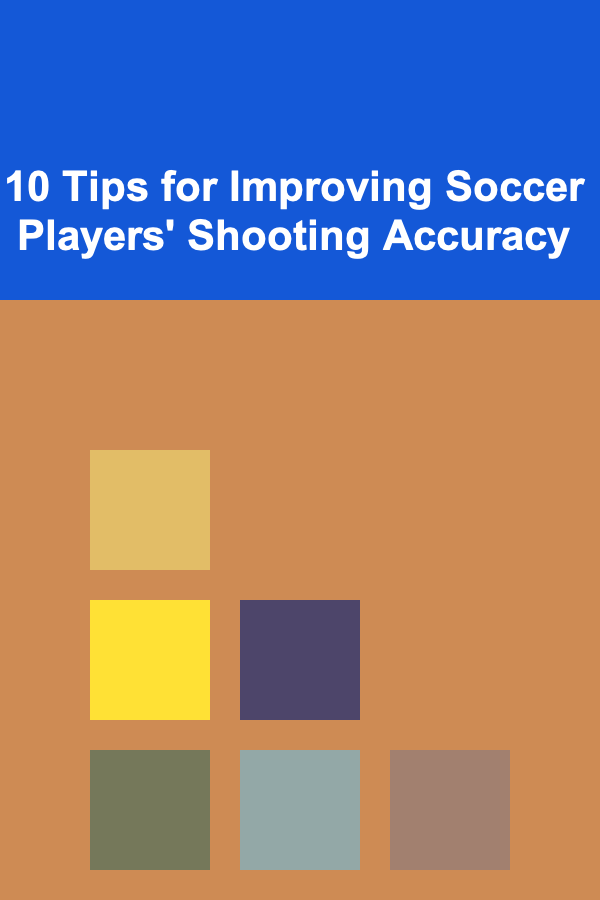
10 Tips for Improving Soccer Players' Shooting Accuracy
ebook include PDF & Audio bundle (Micro Guide)
$12.99$11.99
Limited Time Offer! Order within the next:

In soccer, shooting accuracy is one of the most important skills a player can develop. Whether you're trying to score a goal from a long-range shot or finishing off a quick cross, the ability to strike the ball accurately can make all the difference. However, shooting accuracy isn't something that comes naturally to most players; it requires practice, technique, and mental focus. In this article, we'll go over 10 essential tips that can help soccer players improve their shooting accuracy and become more reliable finishers.
Perfect Your Shooting Technique
One of the most fundamental aspects of shooting accuracy is having the correct shooting technique. A poor technique can lead to inconsistent and inaccurate shots. Here's how to develop proper shooting mechanics:
Focus on Your Foot Placement
When striking the ball, make sure to use the instep of your foot (the part where your laces are). This is the most powerful and accurate part of the foot for shooting. To ensure better control and accuracy, place your non-kicking foot about 6-8 inches to the side of the ball, pointing towards your target.
Keep Your Body Over the Ball
Many players make the mistake of leaning back when shooting, which often causes the ball to go high over the crossbar. To prevent this, lean slightly forward when making the shot, keeping your body over the ball. This will help you strike the ball cleanly and keep it low and on target.
Follow Through
Your follow-through is just as important as the initial contact with the ball. A strong follow-through will give the ball power and help you maintain accuracy. Your foot should continue the motion toward your target after striking the ball, with your kicking leg finishing in the direction of the goal.
Focus on Accuracy Over Power
Many players tend to focus on striking the ball with maximum power, hoping that a strong shot will always find the back of the net. However, more often than not, this leads to wild shots that miss the target. Instead, prioritize accuracy over power.
Aim for Specific Targets
Instead of aiming for the general direction of the goal, pick out specific spots in the net. This could be the bottom corners, the top corner, or even just a small area within the goal. By narrowing your focus, you'll improve your chances of hitting the target.
Controlled Shots
Powerful shots can be inaccurate because they involve more risk. A controlled, well-placed shot, even with less power, is often more effective than a blast. Take your time to set up for the shot and concentrate on precision.
Improve Your Ball Control
Before you can shoot accurately, you need to have excellent ball control. The better you can control the ball, the easier it will be to line up for a shot and execute it with precision.
Master Close Control
Work on close control with both feet so that you can receive the ball and position yourself perfectly for a shot. This will help you get into the ideal shooting position without rushing or making poor decisions.
First Touch
Your first touch is crucial for setting up your shot. Practice taking a clean, controlled first touch that sets the ball up in the right place for your shooting foot. A poor first touch can put you off balance or lead to an awkward shot attempt.
Use Both Feet
While many players prefer to shoot with their dominant foot, becoming proficient with both feet can dramatically increase your shooting accuracy and open up more scoring opportunities. When you have the ability to use both feet, you can adjust to different situations on the field and find better angles to shoot.
Practice with the Non-Dominant Foot
Don't neglect your non-dominant foot. Practice shooting with it regularly to build strength, accuracy, and confidence. In time, your weaker foot will become much more reliable, allowing you to shoot from different angles and situations.
Read the Goalkeeper's Movements
An important aspect of shooting accuracy is the ability to read the goalkeeper's positioning and movements. By observing the goalkeeper's body language, you can make better decisions about where to place your shot.
Take Advantage of Gaps
Goalkeepers will often shift their weight or position, leaving gaps in the goal. Look for these gaps, such as between the legs or to the far side of the net, and aim for them. The more you can predict the goalkeeper's movements, the easier it will be to find the right moment to shoot.
Stay Calm Under Pressure
Goalkeepers often try to pressure shooters into rushing their shots. Stay calm and take an extra second to assess the situation. This moment of calm will allow you to make a more accurate and controlled shot.
Work on Your Shooting from Different Angles
Shooting accurately isn't just about shooting from directly in front of the goal. In a match, players frequently find themselves in situations where they need to shoot from different angles. Practicing shooting from a variety of positions can improve your accuracy in real-game scenarios.
Practice Shots from the Flanks
When shooting from the wings, aim for the far post or the bottom corner of the near post. This angle forces you to be more precise in your shot placement. Practice cutting inside from the flanks and taking quick, accurate shots towards goal.
Shoot on the Move
In many situations, you won't have the luxury of a stationary ball. Work on shooting while dribbling or after making a quick turn. Practicing shots in motion will help you stay accurate even when you're under pressure.
Work on Timing and Positioning
Shooting accuracy is not only about technique but also about timing and positioning. Knowing when to take a shot and where to position yourself on the field can drastically increase your chances of scoring.
Be in the Right Position
Work on your positioning so that you're always in the right place at the right time to receive a pass or take a shot. Understanding the flow of the game and anticipating the ball's movement will allow you to take shots in the most dangerous areas.
Take Advantage of Set Pieces
Set pieces like free kicks and corners present great opportunities for precise shooting. Practice different types of set-piece shots, such as bending the ball over a wall, striking with power, or placing the ball into the corners.
Visualize Your Shots
Mental preparation is just as important as physical preparation. Visualizing your shots before actually taking them can help you stay focused and increase your shooting accuracy.
Mental Rehearsal
Before you strike the ball, imagine the shot in your mind. Visualize the ball going exactly where you want it to, and focus on your target. Visualization can help calm your nerves and increase your confidence when the moment comes to shoot.
Positive Self-Talk
Encourage yourself with positive self-talk, especially in high-pressure situations. Remind yourself that you've practiced and have the ability to score. This mental attitude can significantly boost your shooting accuracy.
Train Regularly and Consistently
Like any skill, shooting accuracy improves with consistent practice. You can't expect to become a great shooter by practicing only once in a while. To see improvements, you must dedicate time to regular shooting practice.
Incorporate Shooting Drills
Set aside specific times during your training sessions to focus solely on shooting. Create drills that simulate game situations, such as shooting under pressure, shooting after a quick pass, or shooting with limited space.
Track Your Progress
Keep track of your shooting statistics. Record how many shots you take and how many are on target. By analyzing your performance, you can identify areas for improvement and continue working on them.
Stay Relaxed and Confident
Shooting accuracy is often hindered by nerves or anxiety. In high-pressure situations, players can become tense, which can affect their technique and decision-making.
Stay Relaxed
Before taking a shot, take a deep breath and relax your body. Tension can cause you to strike the ball poorly, leading to inaccurate shots. Stay calm, focus on your target, and trust in your ability.
Build Confidence
The more you practice and experience different shooting situations, the more confident you will become. Confidence is key to making accurate shots, so build it up through consistent training and success.
Conclusion
Improving your shooting accuracy is a process that requires dedication, practice, and focus. By working on your technique, mental game, and positioning, you can become a much more reliable finisher. Whether you're trying to score from a long-distance free kick or converting a close-range pass, these 10 tips will help you take your shooting accuracy to the next level and make a significant impact on the field. Remember, the best shooters are not only skilled but also confident in their ability to deliver when it counts.
Reading More From Our Other Websites
- [Stamp Making Tip 101] Step‑by‑Step Rubber Stamp Creation: Materials, Tools, and Pro Tips
- [Small Business 101] Best DIY PR Tactics for Independent Film Production Companies Seeking Festival Recognition
- [Home Rental Property 101] How to Maximize Your Enjoyment of Apartments for Rent with a Community Barbecue Area: Recipes, Etiquette, and Safety
- [Personal Care Tips 101] How to Use Hair Mousse for Updos and Ponytails: A Step-by-Step Guide
- [Hiking with Kids Tip 101] Step-Count Challenge: Turning Hiking into a Friendly Competition for Young Explorers
- [Personal Investment 101] How to Choose the Right Fidelity Personal Retirement Annuity for Your Needs
- [Home Maintenance 101] How to Check and Replace Home Insulation for Better Efficiency
- [Organization Tip 101] How to Create a Zen Space in Your Home for Relaxation
- [Home Renovating 101] How to Make Your Home More Accessible Through Renovation
- [Home Holiday Decoration 101] How to Decorate Your Home with DIY Holiday Wall Art

How to Start a Bicycle Delivery Service with Low Startup Costs
Read More
Turning Your Deep Learning Expertise into Passive Income
Read More
How to Make Homemade Nut Milks
Read More
How to Wear Leather (Real or Vegan) Stylishly
Read More
How to Design Your Own Cross-Stitch Patterns for Beginners
Read More
How to Reupholster Vintage Truck Seats
Read MoreOther Products

How to Start a Bicycle Delivery Service with Low Startup Costs
Read More
Turning Your Deep Learning Expertise into Passive Income
Read More
How to Make Homemade Nut Milks
Read More
How to Wear Leather (Real or Vegan) Stylishly
Read More
How to Design Your Own Cross-Stitch Patterns for Beginners
Read More